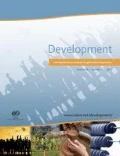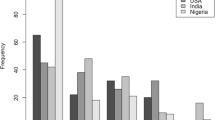Abstract
Ana Agostino and Rosa Lizarde explore the concept of climate justice as a rights approach to climate change. They propose that those in the South who are most affected by environmental changes need to receive justice from those in the North who are most responsible for climate change. They apply a gender lens to climate change, analyzing how women have been specifically hit by the phenomenon and how they are responding.
Similar content being viewed by others
Notes
This article has been adapted from our chapter in Harcourt, 2012. The material for the chapter and article drew on our work as active members of the climate justice movement working with the FTF of the Global Call to Action Against Poverty for which we coordinated a series of Women and Climate Justice Tribunals see http://whiteband.org/en/women-climate-hearings.
The NGO Alternative Treaties from the Global Forum at Rio de Janeiro, 1–15 June 1992, ‘People's Earth Declaration: A Proactive Agenda For The Future’, http://habitat.igc.org/treaties/at-01.htm.
John Braithwaite: ‘Restorative Justice and a Better Future’, http://iirp.org/library/braithwaite.html.
Renewing the Call: The Beirut Platform for the Global Call to Action against Poverty, 15 March 2006, http://www.whiteband.org/en/content/documents-publications.
Oxfam and tcktcktck.org, as well as GCAP, organized climate hearings: The Climate Hearings Project, Oxfam, http://www.oxfam.org/en/campaigns/climatechange/climate-hearings, and http://climatehearings.org/.
Women's tribunals were organized by the FTF and partner organizations in Nigeria, Botswana, Uganda, Pakistan, Bangladesh, India and Brazil during October – November 2009.
International Climate Justice Court, http://pwccc.wordpress.com/2010/02/07/international-climate-justice-tribunal/.
References
Agostino, Ana (2010) ‘Gender equality, climate change and education for sustainability’, Equals Newsletter, Issue 24, February.
Brody, Alyson (2011) ‘Opportunities for Transformation: Innovative approaches to gender and climate change’, Contribution to ICAE Virtual Seminar: towards the ICAE VIII World Assembly. 14 March to 15 April.
Douthwaite, Richard (1992) The Growth Illusion. How Economic Growth has Enriched the Few, Impoverished the Many, and Endangered the Planet, Dublin, Ireland: Green Books.
Harcourt, Wendy (ed.) (2012) Women Reclaiming Sustainable Livelihoods: Spaces gained spaces lost, London: Palgrave Macmillan.
Margolis, Ben and Nomusa Moyo (2009) ‘Poverty Hearings and Women's Tribunals: A report and guide’, January.
McDonald, Mia (2010) ‘Climate Change Impacts on the Achievement of the MDGs: Can we afford not to integrate’, common paper by Realizing Rights, GCAP and GCCA, September.
Meadows, Donella H., Dennis L. Meadows, Jorgen Randers and William W. Behrens (1974) The Limits to Growth. A report for The Club of Rome's Project on the Predicament of Mankind, London and Sydney: Potomac Associate Book, Pan Books.
Michelowa, Axel and Katharina Michelowa (2009) ‘Does Human Development Really Require Greenhouse Gas Emissions?’, in Eija Palosuo (ed.) Rethinking Development in a Carbon Constrained World. Development Cooperation and Climate Change, Finland: Ministry for Foreign Affairs.
Palosuo, Eija (ed.) (2009) Rethinking Development in a Carbon Constrained World. Development Cooperation and Climate Change, Finland: Ministry for Foreign Affairs.
Reilly, Niamh and Linda Posluszny (2005) Women Testify: A planning guide for tribunals and popular hearings, New Jersey: Center for Women's Global Leadership.
Russell, Bertrand (1966) ‘Vietnam War Crimes Tribunal – Aims of the tribunal agreed at the constituting session’, London, 15 November.
Schumacher, Ernst Friedrich (1973) Small is Beautiful. Economics as If People Mattered, New York: Harper and Row.
The World Commission on Environment and Development (WCED) (1987) Our Common Future, Oxford-New York: Oxford University Press.
UN Women (2011) Progress on the World's Women: In pursuit of justice, 2011–2012, New York: UN Women.
Additional information
Explores the concept of climate justice as a rights approach to climate change
Rights and permissions
About this article
Cite this article
Agostino, A., Lizarde, R. Gender and Climate Justice. Development 55, 90–95 (2012). https://doi.org/10.1057/dev.2011.99
Published:
Issue Date:
DOI: https://doi.org/10.1057/dev.2011.99




